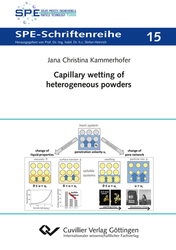| Departments | |
|---|---|
| Book Series (96) |
1381
|
| Nachhaltigkeit |
3
|
| Gesundheitswesen |
1
|
| Humanities |
2370
|
| Natural Sciences |
5408
|
| Engineering |
1795
|
| Engineering | 292 |
| Mechanical and process engineering | 862 |
| Electrical engineering | 688 |
| Mining and metallurgy | 30 |
| Architecture and civil engineering | 75 |
| Common |
98
|
|
Leitlinien Unfallchirurgie
5. Auflage bestellen |
|
Advanced Search
Capillary wetting of heterogeneous powders (Volume 15) (English shop)
Jana Kammerhofer (Author)Preview
Extract, PDF (630 KB)
Table of Contents, PDF (520 KB)
The objective of this PhD thesis is the enhancement of understanding and prediction of capillary wetting of heterogeneous, soluble food powders. Therefore, the capillary penetration is studied experimentally by increasing stepwise the complexity. Firstly, the heterogeneity in terms of contact angle and the effect of solubility during capillary wetting as the two main influencing factors are investigated separately and in a second step both factors are combined. Furthermore, a new model based on the coupling of the Washburn and the mass transfer equation is presented dealing simultaneously with capillary penetration and dissolution. It is observed that the viscosity increase is dominant during liquid penetration for the powder systems containing the most soluble component (sucrose) at a high concentration. For powder mixtures containing a less soluble component with less viscosity development (sodium chloride), the hydrophobic contact angle drives the liquid penetration.
| ISBN-13 (Hard Copy) | 9783736970823 |
| ISBN-13 (eBook) | 9783736960824 |
| Final Book Format | B5 |
| Language | English |
| Page Number | 156 |
| Lamination of Cover | matt |
| Edition | 1. |
| Book Series | SPE-Schriftenreihe |
| Volume | 15 |
| Publication Place | Göttingen |
| Publication Date | 2019-09-09 |
| General Categorization | Dissertation |
| Departments |
Mechanical and process engineering
|
| Keywords | Capillary penetration, Wetting, Dissolution, Heterogeneity, Viscosity build up, Contact angle, Food powder, Reconstitution, Hydrophilic, Hydrophobic, Crystalline sucrose, Washburn setup, Washburn equation, Pore network, Model |








